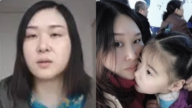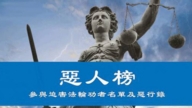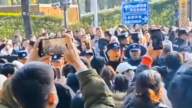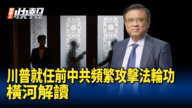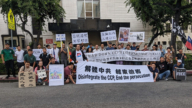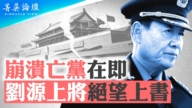【新唐人2014年08月21日訊】8月18號下午,大陸官媒發佈了所謂「媒體改革」消息,中共「中央深化改革領導小組」通過了有關媒體的《指導意見》。大陸傳媒人士指出,換上新衣的新型媒體,仍然是「黨的喉舌」,注定不會有公信力。
中共領導人習近平在「深化改革領導小組」第四次會議上,就推動「新舊媒體融合」表了態。他說,要打造一批形態多樣、手段先進、具有競爭力的新型主流媒體。
中共喉舌《新華網》19號的網評毫不隱諱的承認,目前「主流媒體難以引導主流輿論,主流輿論難以有效傳播主流聲音」,而中共中央給出的所謂「藥方」就是:融合。
大陸傳媒人士指出,中共這次作出媒體改革的大動作,乃是看到官媒影響力日漸衰退,面對互聯網門戶網站、社交媒體、自媒體的合圍,而作出的反擊之態。曾經擔任「雅虎中國」公司總經理的謝文,將之稱為「喉舌2.0版本」。
原「雅虎中國」總經理謝文:「所謂主流媒體,傳統媒體,在整個新聞消息,輿論形成這些方面,越來越吃力,甚至說只能自稱主流,實際上已經不是主流了。總要有個應對的辦法,應對的辦法,除了那種刪貼封號,這些比較野蠻的手段以外,總要想辦法。知道紙媒不行了,就想辦法往互聯網上轉。」
習近平在有關媒體改革的講話最後說,要一手抓融合,一手抓管理,確保融合發展沿著正確方向推進。「北京外國語大學國際傳播研究中心」主任喬木解讀說,「管理」在中國的語境下,實際上就是管控。實際上,當局是希望由官方媒體來融合民間媒體,就是由官媒奪取目前由民營公司盤踞的互聯網領域,而互聯網公司反向滲透,衝擊官方媒體的地盤則不可能。
喬木指出,官方媒體和民間媒體的地位極不對稱,並不處於同一個起跑線。
北京外國語大學新聞學副教授喬木:「官方媒體就有採訪權,有重要新聞的首發權,互聯網門戶網站是不容許採訪,只能做評論和娛樂新聞,不允許做時政新聞,在前不久官方重申確認了一個國信辦的規定,對社交媒體、即時通訊媒體首發新聞做了限制,不允許他們首發新聞。所以在這種存在地位和業務差別的情況下,要融合是很難的。」
謝文表示,現在實際上可以看得出來,今後很有可能的局面是,當局一方面強力扶植官方媒體,一方面打壓民營的媒體平臺,對民營媒體刪貼封號,嚴管牌照,包括實行某種形式的恐嚇。但是他認為,即使民營媒體都被封掉了,網絡用戶也不會自動轉移到所謂主流媒體的平臺上去。
習近平還表示,新型媒體集團應該「擁有強大實力和傳播力、公信力、影響力」。
可是,謝文認為,中共一直在追求提高喉舌的宣傳功率,卻不可能做到。
謝文:「它的基本使命和管理機制,限制了比如公信力的問題。消息你不報導,大家就在網上傳,等到最後終於報導的時候,一個是過時的消息,一個是各種各樣的刪改,使得公信力沒有。這個不是靠甚麼手段,靠甚麼技,所能解決的。」
喬木也表示,中共媒體改變的只是技術手段和媒介形態,不是內容,終究無法獲得公信力。
喬木:「里面新華社提到一個最關鍵的公信力,他這個沒法解決,因為你還是黨來辦的,政府來扶持的,那就有很強的政治導向,那有了政治目地,你再講公信力,那顯然是不可能的。它是為政治服務的。只有有了公信力,才有影響力。」
「廣州中山大學傳播與設計學院」院長張志安對「英國廣播公司」《BBC》表示,中國主流媒體的「底線和底色」,並不會因為言論的尺度或許較前寬鬆而有變化,這是中國的現實決定的。
採訪編輯/秦雪 後製/周天
Mouthpiece Version 2.0: China’s New Style Media
On Aug. 18, China state-run media released news about media
reform with approved guidance from the central reform team.
Experts point out even if the media changes to a new style,
it is still the mouthpiece of the Chinese Communist Party
(CCP), so it certainly won’t have much credibility.
China leader Xi Jinping, spoke at a meeting of the central
leading group for reform,
about the combined new and traditional media.
He stressed the build ing of new-type mainstream media groups,
with multiple styles, advanced and competitive.
The CCP’s mouthpiece, Xinhua website admitted that
currently, mainstream media has difficulty in leading opinion,
or effectively spreading the mainstream voice.
The central regime’s reform for media is to “combine
traditional media with new media forms”.
Experts say that it is a CCP counter attack, in the face of
criticism from netizens, social and nongovernmental media,
because it realizes that the influence of its mouthpiece
media is declining.
Xie Wen, former president of Yahoo China called
the reform “mouthpiece version 2.0”.
Xie Wen: “The so-called mainstream media or
traditional media finds news reporting difficult.
It claims to be mainstream, actually it isn’t.
They try to find a way to deal with it, other than deleting
online messages, violent methods, or looking the other way.
They know the newspaper is dying,
so they intend to find a way on social media.”
Xi Jinping finally suggested that media reform should focus
on combination and management,
and ensure the combination development
goes in a correct direction.
Qiao Mu, director of Beijing School of English and International
Studies said that word “management” in China means “control”.
The regime is hoping state-run media combines with
nongovernmental to take over private-run social networks.
However, it is impossible the other way round that social networks
take over state-run media.
Qiao says that state-run and nongovernmental media
are neither in the same position nor on the same line.
Qiao Mu: “State-run media has a right to report and interview,
has the right to publish important news first.
Social media is not allowed to interview but only
to make comments or report on entertainment news.
It is not allowed to report current affairs.
Recent new measures from the central regime
restricted social media reports on breaking news.
Social media is not allowed to be the first media
to report news.
So under this unfair condition, to combine media is difficult.”
Xie Wen says that from his observation, the future situation
would be that the regime strongly develops state-run media,
suppressing nongovernmental media platforms,
deleting messages, closing users accounts,
and restricting licenses including a kind of threat.
Xie says even if all nongovernmental media were shut down
netizers would not move to the so-called mainstream platform.
Xi Jinping also stressed that “new style media groups”
should have “strength, ability to spread,
credibility and great influence”.
Xie Wen says that the CCP pursues efficiency of
propaganda but it can’t achieve this.
Xie Wen: “The CCP’s fundamental task and management
limit issues such as credibility.
If they don’t report the news, people will look it up online.
When news is finally reported, it either becomes old news
or re-edited and censored news, thus losing credibility.
Any kind of methods or technique
cannot solve such problems.”
Qiao Mu says that the state-run media only changes its
technique and style but not the content.
Indeed it cannot gain any credit.
Qiao Mu: “Xinhua News Agency mentioned an important
point is credibility but they cannot resolve this problem.
Because the media is run by the CCP, supporting the regime.
In this regard, it has strong political intentions and goals.
Then it talks about credibility again, it becomes impossible,
because it serves politics.
Only if credibility exists, can influence be applicable.”
Zhang Zhi’an, dean of the School of Communication
and Design, Sun Yat-sen University told the BBC that
the bottom line of mainstream media in China wouldn’t change,
not just because of slightly easier expression,
this is decided by the current China.
Interview & Edit/QingXue Post-Production/ZhouTian



